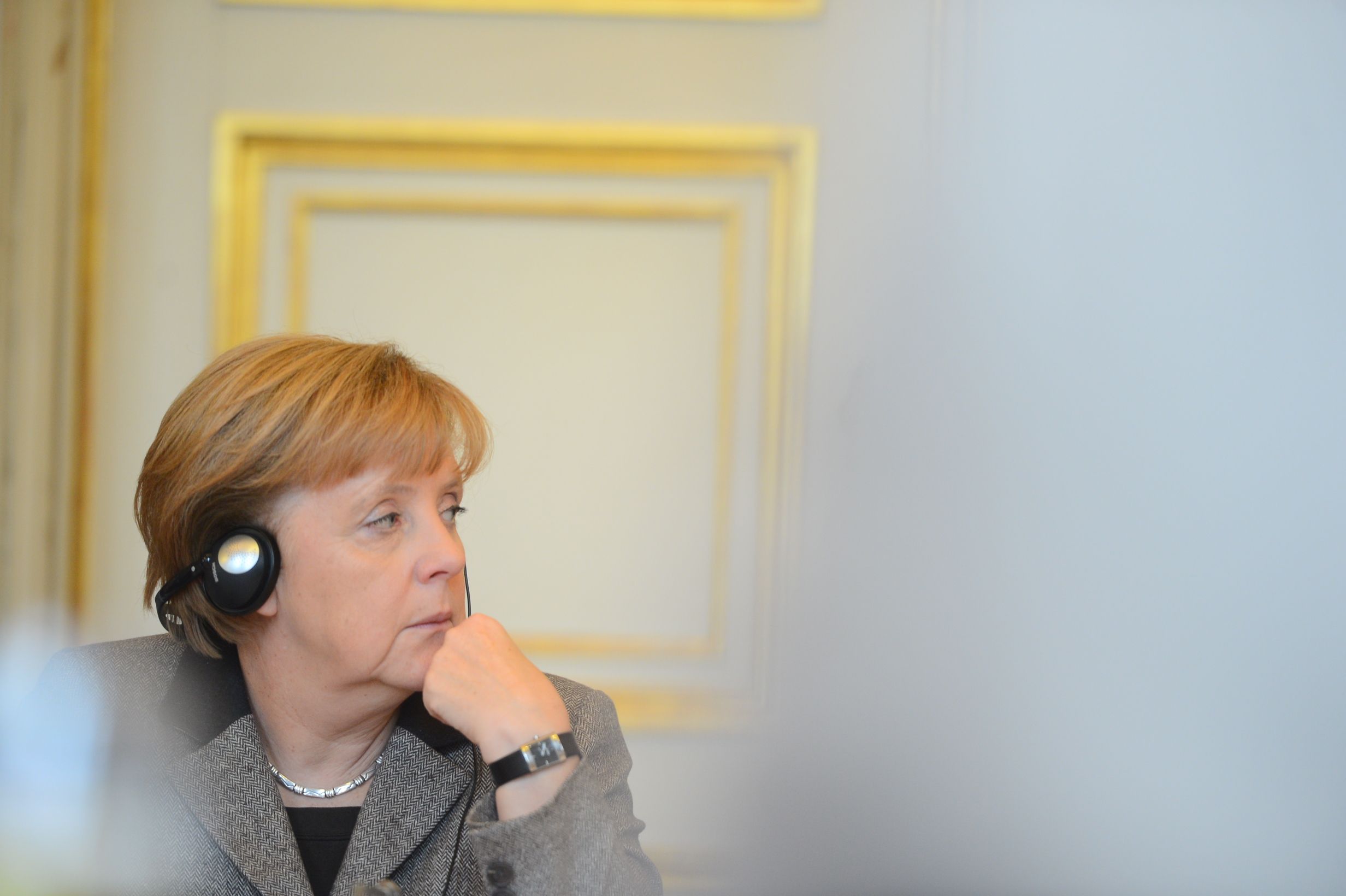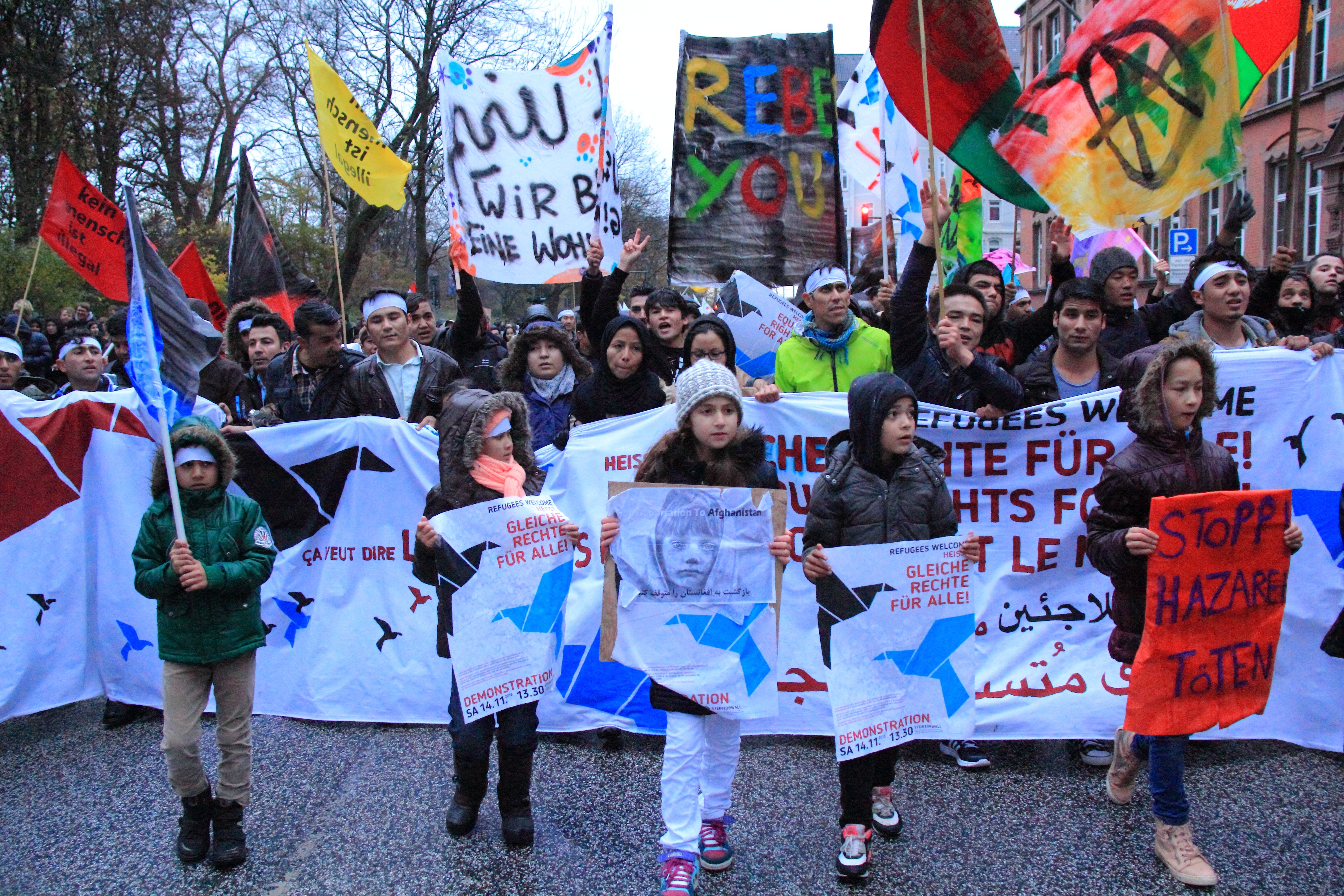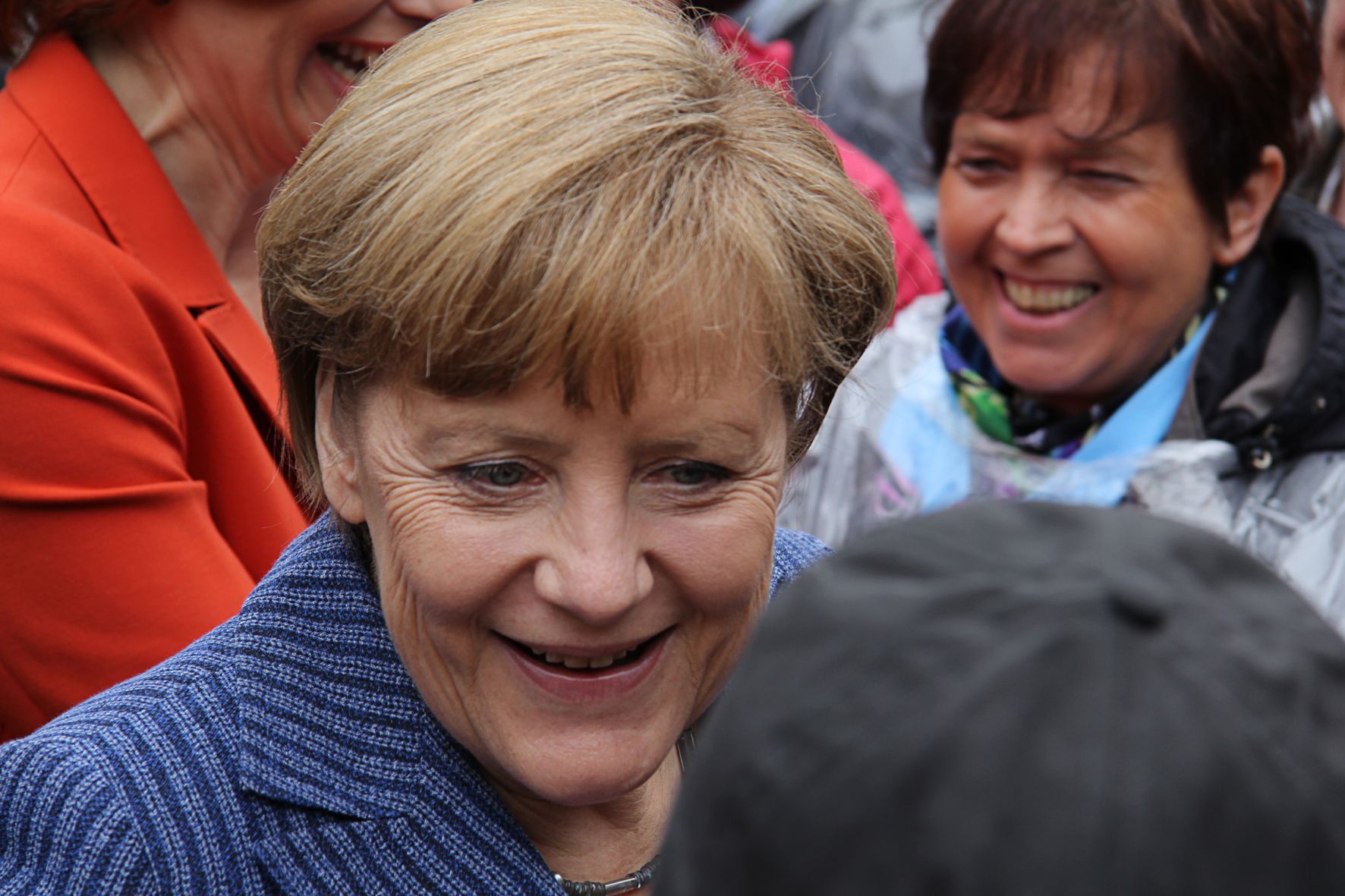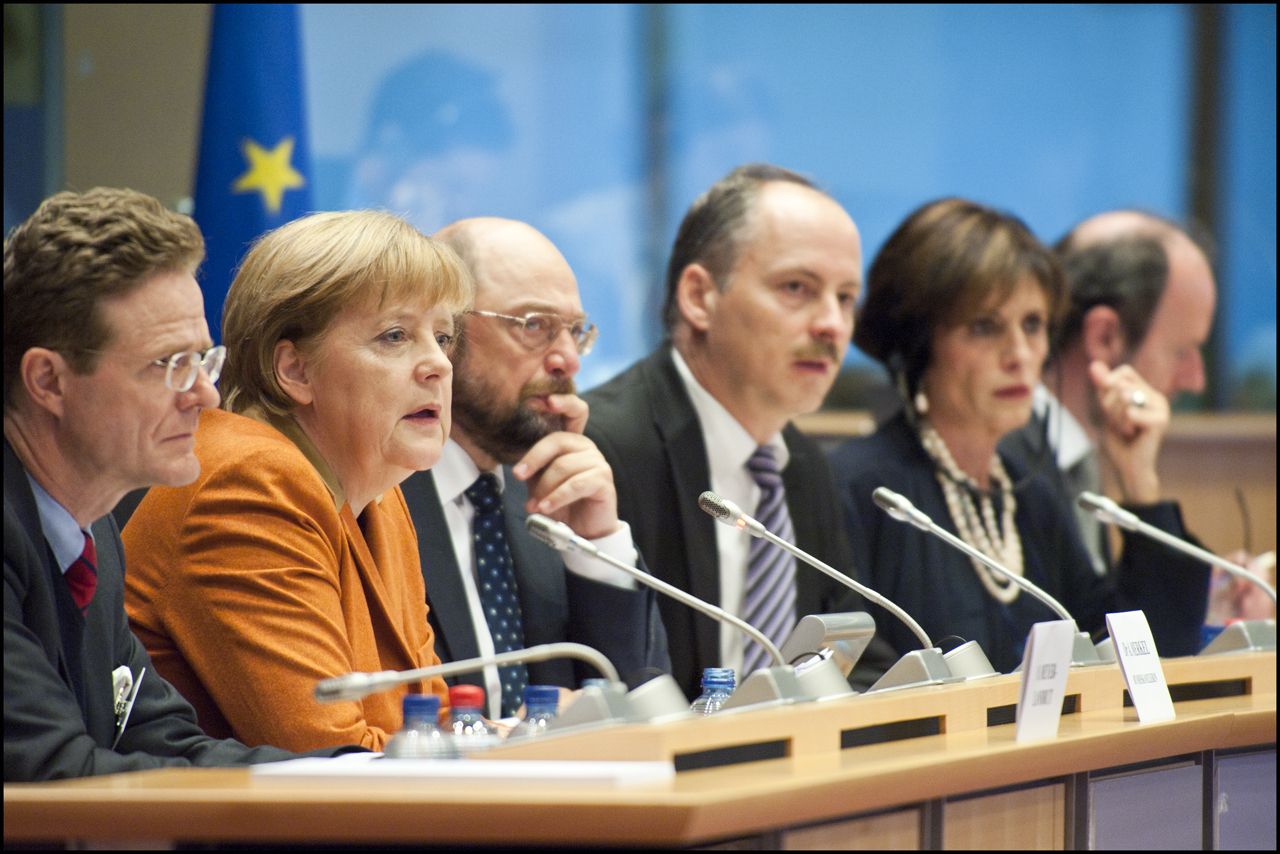Two weeks after her decision in early September 2015 to open Germany’s borders to any Syrian in search of asylum, Angela Merkel felt compelled to respond to her critics. “I have to honestly say,” she declared at a press conference in Berlin, “if we’re going to start having to apologize for showing a friendly face at a time of crisis, then this isn’t my country anymore.” It was an argument that Germany’s identity — and, by implication, Europe’s — was inseparable from its values and its actions in service of them.
It’s also an argument that, in the two years since Europe began integrating millions of people fleeing the Middle East, has lost much of its force. Merkel’s words, like those of her European peers, are typically still warm to migrants, and she has never ceased defending her commitment to create a “welcoming culture.” But, rhetoric aside, Europe — including Germany — has become much less friendly toward outsiders in the last two years. Which once again raises the question Merkel posed in 2015: Is Europe, as defined by its commitment to core liberal values, still recognizable to her or anyone else?
This year, Italy is on pace to receive more than 150,000 migrants from Africa, joining the 500,000 who arrived in the previous three years; thousands more died at sea along the way. Like the Syrian migration crisis, this current wave of new arrivals represents many things: a potential humanitarian disaster, an object lesson in the human consequences of impoverishment, and a natural experiment in prevailing theories of development aid and international relations. But European leaders, including Merkel, have treated this latest crisis mostly as a problem of political algebra, one defined by the imbalance between the number of Africans who wish to live in Europe and the number that can be accommodated without sparking revolt, or serious discontent, from European citizens.
Different parts of the continent are inclined to solve for the equilibrium in different ways. In Rome, politicians have been pressing European states for assistance, demanding that they accept a share of the migrants arriving on Italy’s shores — and threatening, absent such assistance, to issue those migrants visas that would permit them to travel anywhere in the EU. Most other countries in Europe, citing EU law, claim that they have no obligation to help and that the burden is on front-line countries like Italy to better protect Europe’s southern borders from migrants, more efficiently process the asylum claims of those who manage to circumvent those defenses — and return to Africa anyone whose claim is rejected. In Eastern Europe especially, official government policy is increasingly indistinguishable from reactionary populism. Poland, Hungary, Slovakia, and the Czech Republic have all refused to participate in an existing EU plan that obliges them to accept Middle Eastern refugees currently stranded in Greece. Hungarian Prime Minister Viktor Orban has not only ignored the EU Commission’s appeals by building two fences along his country’s border with Serbia, but defiantly asked the rest of Europe to foot the bill.
Meanwhile, European NGOs operating in the Mediterranean are claiming the humanitarian emergency posed by migrants facing danger and death en route should override other political concerns — even as establishment parties across the continent are warning that humanitarianism is outweighed by the political emergency posed by rising populism at home.
European conflicts of this sort tend not to get collectively addressed unless Germany, whose thriving economy makes it first among equals in the horse-trading that accompanies all European Union negotiations, insists on it. So Europe’s approach is obliged to exist in the space carved out by two recent statements by Angela Merkel. This July, in her annual “summer interview” with German national broadcasters, the chancellor was emphatic in referring to her government’s commitment to accepting refugees: “When it comes to placing a ceiling on the number of migrants, my position is clear: I will never accept that.” But several months earlier, Merkel gave a public speech in which she expressed regret over her decision in 2015 to open Germany’s borders to approximately 1 million Syrian refugees: “Nobody wants a repeat of that situation, including myself.”
Such is Merkel’s stated dual mandate: no compromise on ethical principles, but no compromise on a commitment to Europe’s socio-cultural status quo and political order. The result is the present set of compromises that comprise European policy toward the recent surge in African migration: a rhetorical commitment to accepting anyone with a legitimate claim to refugee status paired with a host of measures — including development and security assistance to African dictatorships and fragile states — designed to prevent as many people as possible from making that claim by persuading, or compelling, them to not leave Africa in the first place.
Migration researchers look at Merkel’s criteria and see a moral muddle — an unworkable contradiction — with the near-record number of migrants from Africa this year, and regular mass drownings in the Mediterranean Sea, serving as the inevitable result. For Germans, by contrast, the muddle is the point. What looks like denial feels to them like reassurance. It is no accident that they have just elected Merkel to a historic fourth term as chancellor.
It’s not yet clear whether, or how long, other Europeans in places like Italy that are closer to the front lines of the crisis will be persuaded of the virtues of this German approach — or rather whether the steady pressure of new arrivals from Africa will lead them to adopt new measures aimed at keeping Europe European. Left- and right-wing populist politicians in Italy have begun proposing that the country — in violation of its commitments under international law — find new ways to keep additional migrants from reaching it so that Rome can avoid the obligation to consider their asylum applications. Such proposals may horrify human rights advocates but are being embraced by many voters: The populists’ poll numbers continue to rise.
For now, Europeans appear to have little choice but to continue following Merkel’s lead. Her Social Democratic challenger in the Sept. 24 election, Martin Schulz, previously served as president of the European Parliament for five years and had a more expansive vision of European cooperation and German leadership to address common continental problems. But his efforts to use the German election campaign to initiate more open discussion about how to compel cooperation in resettling African migrants across Europe failed. At campaign stops across the country, Schulz talked himself hoarse attacking Merkel for obfuscating that Europe is in the middle of a new migration crisis and for refusing to risk asking Germans and other Europeans to formally agree to accept a share of any Africans who reach European territory. He arranged a trip to Italy, with German media in tow, to meet with the Italian prime minister and discuss the burdens his government has faced in dealing with the issue — at once a rebuke to Merkel, who has yet to make such a visit, and a wake-up call to the German public.
But Germans showed little inclination to oblige Schulz, whose party received only 20 percent of votes in the election. In hindsight, this lack of enthusiasm for Schulz and his calls to solve the crisis should be no surprise. In Germany, like most of Europe, there’s little evidence that there’s a crisis at all. A visitor right now to Berlin or Vienna, Budapest or Lyon, won’t witness scenes anything like the bureaucratic and social improvisations triggered by 2015’s waves of Syrian arrivals. Even at the nerve center of Germany’s Interior Ministry, tasked by the chancellery with managing migration policy, senior officials convey calm and control, not anxiety. Today’s crisis is still concentrated in the Mediterranean Sea and the countries that border it.
But the problem isn’t just that Europeans don’t yet sense there is a crisis that needs addressing. Even if they did, many would still not want to deal with it. A recent poll showed that 54 percent of Germans didn’t want migration to be politicized in the national election campaign — that is to say, they would prefer it to be a crisis that’s handled quietly by political professionals, rather than one that burdens public debate.
Germany has no shortage of political professionals dedicated to migration, and they all seem to agree on one thing: Europe’s current migration policies, including those championed by Germany, don’t add up. “What we’re doing doesn’t yet add up to a solution,” says Günter Nooke, Germany’s special envoy for Africa.
Consider the focus on development: Angela Merkel’s government has been touting the billions of dollars it spends on foreign aid as a way to combat mass migration, even heralding it as a major outcome of the G-20 summit it hosted this summer in Hamburg. The idea is that by injecting money into Africa — building factories, creating jobs, and staffing training programs — it will reduce the likelihood that poor young men will risk the dangerous Mediterranean crossing. “But we have been doing this development aid for decades,” says one official at the German development ministry, who requested anonymity to freely criticize his own department’s policies. “And now we slap a new label on it, call it a Marshall Plan, and imagine it will solve migration policy. It wasn’t working before! It’s supposed to work now at something completely different?”
The question, of course, is what it would mean for a European migration policy to “work” at all. Marginal increases in foreign aid will do little to address underlying demographic forces. The population of sub-Saharan Africa is expected to expand dramatically in the coming decades, with 800 million working-age people entering the labor force between 2010 and 2050 and some unknown fraction of that number inevitably trying to reach Europe.
It’s against this background that Nooke, the Africa envoy, admits that his vision for a worthy solution to the migration crisis doesn’t follow the model of Merkel’s quiet incrementalism. Instead, he suggests adopting World Bank chief economist Paul Romer’s controversial proposal, originally made in an entirely different context, for “charter cities” — special economic zones that would be administered by Europe on African territory with the goal of attracting intra-African migration. “Europe could help create this,” Nooke tells me. “This is possible. And this is the sort of creative thinking that we need to end this crisis.” It’s also the sort of thinking that inevitably inspires cynicism about its resemblance to European colonialism. Amid the search for similarly permanent solutions, some migration researchers offer their more radical ideas: Europe subsidizing contraception as a way to manage Africa’s soaring population growth or helping facilitate migration from Africa to emerging markets in Asia that are in greater need of labor. These ideas have remained on the fringes until now — but the same was once said of nativist parties that now regularly vie for political power across Europe.
Gerald Knaus has been busy pitching an entirely different path toward resolving the present crisis. Knaus is the founder of a small think tank in Berlin called the European Stability Initiative, best-known for helping design the framework for the 2016 deal between Europe and Turkey that helped stem the flow of Syrian refugees to the continent by tasking Istanbul with ensuring, through means mostly left unspecified, that they would cease reaching Greek shores. Knaus’s new “Rome Plan” aims to address the present crisis by persuading African countries to agree to accept the return of a greater number of their citizens who have reached Europe’s shores (something those countries are presently reluctant to do, in part because their economies depend on remittances), in exchange for Europe’s agreement to accept a predetermined number of migrants through official channels every year.
It’s a coherent framework and seems all the more so when described with Knaus’s irrepressible conviction. But until now Knaus has had trouble getting European leaders to sign on — perhaps because, in formalizing legal channels for migration, the Rome Plan would require that they publicly explain to their citizens that they will have to be prepared to accept at least tens of thousands of African migrants per year, essentially in perpetuity.
Whatever form a sustainable permanent solution to African mass migration were to take, it would require dramatic efforts by Europe’s political establishment — to persuade Europeans to integrate a significantly greater number of Africans over a significantly greater duration of time (as in Knaus’s proposal), to open their pocketbooks sufficiently widely to help create viable African economies that can support Africa’s youth bulge (as in Nooke’s), or to throw international law out the door and build a deeper moat between the continents. The former two options are monumental, perhaps impossible, challenges; the latter morally untenable — simply put, it would change what modern Europe has come to stand for.
And so, at the heart of Europe, Merkel’s team has been weighing how best to design trade-offs that balance this tension. The German government, for instance, wants to avoid doing anything that encourages more Africans to head for Europe, but at the same time German law promises certain welfare-state benefits to any migrant residing in Germany, whether permanently or temporarily. In 2012, Germany’s Constitutional Court declared that any resident of the country was entitled to the minimal resources necessary to live a dignified life. The German government has nonetheless tried to find ways to pass laws that would counteract the attraction that might pose to future migrants. In March 2016, the government passed a law putting a moratorium on visas for the family members of newly arrived refugees; that same year, it also passed measures making it easier for Germany to deport any migrant whose asylum application had been rejected. Merkel’s ongoing refusal to grant legal residency to any African migrants who arrive in Europe through Italy — while blocking similar EU proposals that would mandate such integration — is an attempt to deter further migration.
Another trade-off concerns foreign policy: how to reconcile Europe’s commitment to the spread of democracy and human rights with the fact that controlling migration requires working with unsavory dictatorships in Africa that hardly claim to respect either. “Of course we shouldn’t be cooperating with dictatorships,” says Nooke, the Africa envoy. “We should be pushing for democratization. But we have to try everything.… And the German public needs to understand that.” To that end, Merkel’s government has openly, if quietly, acknowledged the human rights shortcomings of Europe’s new African security partners — as reflected in the German Foreign Ministry’s leaked internal cable that the jails administered by the Libyan government approach “concentration camp-like” conditions — while maintaining its commitment to the partnerships nonetheless.
Europe’s overall strategy amounts to two separate, but interlocking, deferments of responsibility. The first deferment is chronological; it aims to buy time, to put off the moment that European citizens feel obliged to make a decisive reckoning between political order and political values. The second deferment is geographic; it asks others, outside of Europe, to do the dirty work required to buy this time. The key to synchronizing these separate gears is Europe’s ability to communicate different things to different audiences at the same time. Would-be migrants must be made to understand that if they risk undertaking a journey to Europe, the protection of their basic rights will not be anyone’s foremost concern. Africa’s dictatorships and fragile states must be persuaded that Europe is serious about — and willing to pay for — the enforcement of security measures to keep Africans in Africa. And European citizens must somehow be reassured that none of this marks, or promises to in the near future, any significant shift in either Europe’s way of life or sense of itself as a moral, just, and generous place.
At the least, it would be accurate to call this approach hypocritical. No other word seems better suited to describe Merkel’s continued self-praise for her response to 2015’s “humanitarian” crisis, with her acceptance of the systemic human rights violations overseen by Europe’s partners in Africa. There are those who think such hypocrisy is unsustainable, given the ubiquity of reporting about the mistreatment of migrants in Africa by journalists and NGOs and by migrants themselves via social media. For now, however, Europe is content to wager that this hypocrisy can be sustained long enough — that is, until any given national election.
But it would be a mistake to expect any major shifts in European migration policy now that Merkel’s has won re-election. Senior German officials responsible for overseeing the policy response to African migration believe Europe’s current set of policies is already working. Summer traditionally sees a spike in arrivals, but the number of migrants who crossed the Mediterranean in July and August this year declined by half from previous months. Merkel’s government believes that if the policies continue to be carried out — with some as yet unspecified accommodation for improved human rights oversight in Libya, Niger, and elsewhere in Africa — then the migration problem can be indefinitely brought under control, if not permanently solved. And, in that case, the term “crisis” would no longer apply to the phenomenon of African migration.
Other European countries seem to agree. At a mini-summit organized by Merkel in late August involving European and African leaders with the explicit goal of reducing the number of African migrants arriving in Europe, French President Emmanuel Macron praised Italy’s cooperation with Libya’s coast guard, despite the many reports of lawlessness and impunity. “What has been done by Italy and Libya is a perfect example of what we are aiming for,” Macron said.
But experts are doubtful. Even if there is a temporary lull, they argue that the structural causes of migration — above all, the massive inequality in economic opportunity and population growth — guarantee that the phenomenon will worsen in the years and decades to come. Meanwhile, the moral compromises involved in setting up security partnerships with African autocracies have not yet been put to any significant political test. There has yet to be a scandal in Africa, or death in the Mediterranean, that has concentrated the mind of a European electorate on the moral calamities paid for with their tax money and performed in their names.
European officials do not deny that their present policies are a compromise; indeed, like policymakers everywhere, they embrace that term for its suggestions of pragmatism. The measure of pragmatism, however, has always been results, and, in the present case, this is a standard that may prove unforgiving. In the face of African migration, Europeans have been content thus far to loosen their grip on some of their most deeply held convictions, from the universality of human rights to the sanctity of the cultural and ethnic makeup of their societies. But nobody can know in advance how far the grip on such convictions can be loosened before the public will feel something inviolable is beginning to slip.
What seems clear is that this tipping point will continue to be tested by African migrants motivated by their own convictions about the sanctity and dignity of their lives. And if the compromises cease working, and a more fundamental moment of reckoning arrives, Europe may be shocked to discover just how much, politically and culturally, its pragmatism has placed at risk. “If you sell your soul, and it still doesn’t work?” Knaus says. “You don’t want to find yourself in that position.”
Cameron Abadi (@CameronAbadi) is deputy editor, online, at Foreign Policy.



